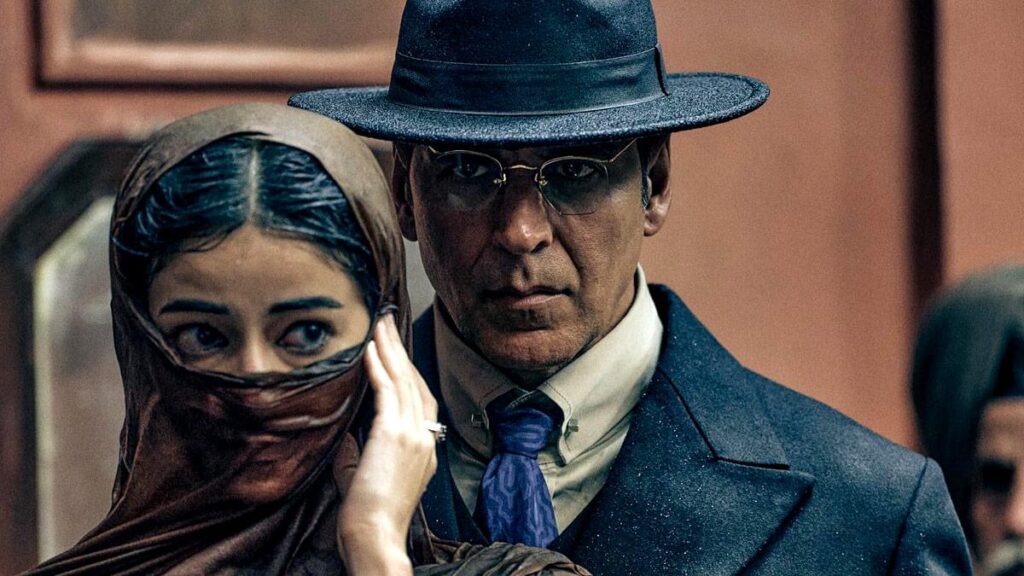Kesari Chapter 2 has more style than substance on its mind, discovers Sukanya Verma.

As is usually the case, the untold story in Kesari Chapter 2 is actually an inaccurate one wherein history is juggled and chronology is shuffled for the sake of drama.
True identities and occurrences are evoked but tweaked beyond recognition to design a chapter in India’s pre-Independence era that sounds far more sensational when told through the prism of film-making.
So a case of libel becomes a fight against genocide and a devil’s advocate transforms into an F-word blasting freedom fighter as fictionalised twists and turns are tossed until an over five-week long courtroom battle acquires the air of a spectacle that’s nationalist and cinematic in equal measure.
Knighted by the British, member of the viceroy council, president of the Indian Congress and eminent lawyer, Sir Chettur Sankaran Nair did a world of good when he stuck to his guns after Michael O’Dwyer — Punjab’s lieutenant-governor from 1913-1919 — sued him in a defamation case for criticising the latter’s role in the Jallianwala Bagh massacre in the book, Gandhi and Anarchy.
In the movie, based on Raghu and Pushpa Palat’s book The Case That Shook the Empire, O’Dwyer is a largely peripheral figure in the story, marking his attendance every now and then with a smirk or smoking into the screen.
Instead, roles are reversed as it is Nair filing a lawsuit against the Crown and General Reginald Dyer for the bloodshed in Amritsar’s Jallianwala Bagh where countless men, women and kids are mercilessly gunned down at Dyer’s orders.
Writer-director Karan Singh Tyagi’s period piece begins with poetically composed snapshots of Nair receiving his knighthood at the same moment as the carnage with scenes intercutting between that of honour and horror.
Actually though, the dates do not correspond. The lawsuit took place in London, not Amritsar, and Nair didn’t fight his own case. He was represented by Sir Walter Schwabe.
Authenticity be damned, so long as Nair goes all blazing guns after the empire and makes his point about declaring the British as guilty. While there’s undeniable patriotism sparking merit in its ideals, Kesari 2, a spiritual, saffron sequel to the first one that focused on Battle of Saragarhi in 1897, is tediously one-note in its insights and enthusiasm.
An Indian underdog standing up to its British masters and emerging triumphant on moral or historical grounds is a done-to-death premise and feels more burned out than ever when harping back on the same old arguments of their conceit and our rebellion.
Aristocratic desiS changing their mind about serving racist British lords and fighting for their country’s cause when meted out the Dogs and Indians not allowed treatment, encounters with young martyrs and old bringing about a shift in conscience, going all ballistic on the robotic Hindi-speaking goraS while they scowl away in the tradition of Bob Cristo, the déjà vu Kesari 2 throws our way is relentless and exhausting.
The main source of this monotony is Akshay Kumar.
Playing yet another real life hero with the same righteous rage he’s turned into his calling card, the actor’s ‘more of the same’ shtick has long lost its appeal.
Making his entry like a true Bollywood hero only after the court proceedings have commenced, a swaggeringly Akshay walks into the room with his black robe floating like Batman’s cape and a gallant music in the background announcing his arrival against awe and amazement.
Expect nothing less as soon Vicky Kaushal’s voiceover tells us how our man’s well-versed in the art of everything from Kathakali to ‘kalam‘.
Hogging all the limelight as usual, Akshay’s monologues or below-the-belt jibes on the Empire leave little room for his co-stars to show off their mettle.
Despite her best intentions and wide-eyed idealism, Ananya Panday’s lady lawyer is reduced to a glossy side-kick looking for breakthroughs in heritage buildings and dusty files. Both her and Regena Cassandrra, in the role of Nair’s wife, exude the stylish perfection of a vintage postcard but never go beyond personal or professional anchors to the leading man.
Like Akshay, R Madhavan, too, appears to be stuck in a rut. Repeating his eccentric, offensive, meanie gig as Nair’s opponent in court, he growls and grimaces away to glory. We are informed how he and Nair used to be friends but forget a glimpse of their frenemy camaraderie, there’s no dialogue to suggest they ever had any history.
Too often, the slickly put together Kesari 2, replete with Masaba doling out a 1920s-style cabaret and Akshay in his fancy retro hats, has more style than substance on its mind.
What’s more interesting if only fleetingly addressed is how Dyer, played to beastly perfection by Simon Paisley Day, was possibly a victim of his own wobbly mind and unaddressed childhood trauma resulting in lifelong toxicity.
If only the makers had dug deeper into his complexities as well as Nair’s politics and struggle instead of concocting romantic scandals in the garb of rape accusations or white protestors painting black paint on a brown lawyer, Kesari 2 could be a work of some nuance.
Ultimately, the script resorts to A Few Good Men‘s iconic approach to drag a confession out of the bad guys. Funny how little that means in the court of law set by Bollywood standards.
Kesari Chapter 2 Review Rediff Rating:



